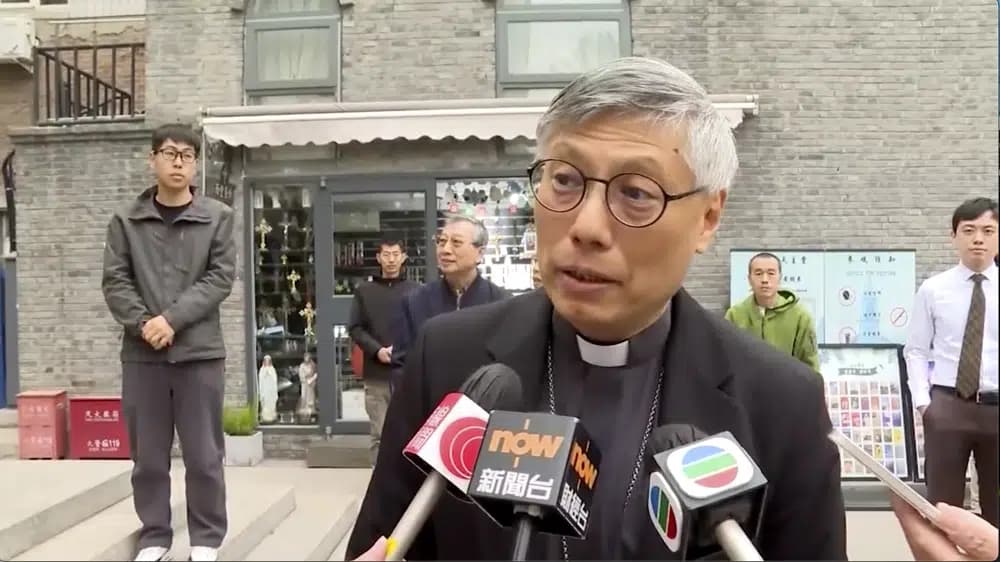ROME – Hong Kong’s Bishop Stephen Chow closed a five-day visit to Beijing this week urging love for both Church and state and extending an invitation to his mainland counterpart, at a time when Vatican-China relations are facing increased strains.
Chow, 63, was invited to visit by Beijing Bishop Joseph Li Shan sometime last year.
He made a five-day visit to Beijing from April 17-21 alongside Hong Kong auxiliary bishop Joseph Ha and the diocesan vicar general, Father Peter Choy, as well as Chow’s personal assistant.
In a statement announcing his visit, Chow said the trip “underscores the mission of the Diocese of Hong Kong to be a bridge…and promote exchanges and interactions between the two sides.”
His visit marked a significant milestone, as it was the first time a Hong Kong bishop traveled to Beijing since 1985, when Hong Kong was still a British colony.
For decades, Hong Kong has been a Catholic stronghold on the edge of mainland China, where Catholics and members of other religions have at times faced persecution under the officially atheist Chinese Communist Party rule.
According to AsiaNews, Chow on his first day in Beijing participated in a Vespers service at the Church of the Savior alongside Li Shan, the so-called “official” bishop of Beijing, who has chaired the state-sponsored Chinese Catholic Patriotic Association since last summer, along with a few dozen faithful.
An image of famed Jesuit missionary in China Matteo Ricci, declared Venerable by Pope Francis in December, was placed at the altar.
According to Fides news agency, during the Vespers service a prayer drafted by the Diocese of Hong Kong for Ricci’s beatification was recited, saying, “Through his outstanding example, rekindle our missionary zeal so that we may learn to practice the truth in love in our daily lives and lead others, especially our Chinese brothers and sisters, to know and love you.”
Chow and his delegation visited Ricci’s tomb as part of their visit to Beijing, which also included stops at various initiatives run by state-sponsored church entities.
According to Hong Kong news site RTHK, Chow during a Mass at Beijing’s cathedral on Thursday urged greater cooperation between the Hong Kong church and its mainland counterparts, saying, “The Holy Spirit is a uniting God and not one that divides.”
“So, we hope our two dioceses can have more cooperation and exchanges and get to know each other more, to bear witness for God’s communion,” he said, stressing the need to listen to one another in the spirit of Pope Francis’s Synod of Bishops on Synodality.
Li Shan, according to RTHK, voiced hope that the relationship between the Hong Kong and Beijing dioceses can develop “according to God’s will.”
Speaking to reporters after the Mass, Chow said his visit to Beijing allowed for a meaningful exchange between he and Li Shan on how to draw in younger vocations.
He also underlined the importance of loving both the state and the church, saying, “We all have to learn to love the country and the church. Everybody wants their country to do well. Nobody wants their country to be bad. Being patriotic is a duty. If you are resident of Hong Kong or the mainland, you should love your own country,” according to RTHK.
Chow apparently dismissed suggestions that his trip was an “ice-breaking” moment and noted that former Hong Kong bishop Cardinal John Wu had visited three cities in mainland China in 1994, saying his own trip continued that tradition.
Asked about Hong Kong’s role in what are increasingly tense Sino-Vatican ties, Chow said the Hong Kong Diocese can serve as a bridge to foster dialogue at the grassroots level and said he had invited Li Shan to visit Hong Kong.
The Vatican and China signed a controversial provisional two-year agreement on the appointment of bishops in 2018 that has been renewed twice. The deal, which has been harshly criticized by both civil leaders and prominent Catholic prelates, was aimed at ending the divide between a so-called underground flock loyal to Rome, and an official state-backed church which has been in place more or less since the 1950s.
Among the most prominent Catholic critics of the deal is 90-year-old former Hong Kong bishop Cardinal Joseph Zen, who was arrested last May and charged in November along with several others for failing to properly register a now-defunct fund supporting pro-democracy protests. As a result of his guilty verdict, Zen was fined HK$4,000 ($512), but was spared any jail time.
The Vatican and China’s agreement has come under increased doubt in recent months as Chinese authorities have twice publicly violated the deal by appointing or transferring bishops without the Vatican’s permission.
Last November Bishop John Peng Weizhao was installed as an auxiliary bishop for the Diocese of Jiangxi, an ecclesiastic territory recognized by Chinese authorities, but not by the Vatican.
Peng Weizhao was appointed to the papally-recognized Diocese of Yujiang by Pope Francis in 2014, four years before the 2018 agreement, but his transfer to Jiangxi was made without prior consultation or permission from the Vatican.
Earlier this month Chinese authorities made a similar move when Bishop Shen Bin, leader of the nearby Diocese of Haimen (Jiangsu) and head of the state-backed Council of Chinese Bishops, was installed as the new bishop of Shanghai without prior the Vatican’s prior knowledge or approval.
While the Vatican hit back vocally against Weizhao’s appointment, they were largely silent about Shen’s transfer.
There is one more year left before the provisional agreement expires, and given recent tensions, it is unknown whether the Vatican intends to renew it again or not, yet Chow’s visit to Beijing and his invitation of Li Shan to come to Hong Kong appear to suggest that for the moment, they are still choosing to keep the door open to dialogue.
Follow Elise Ann Allen on Twitter: @eliseannallen














